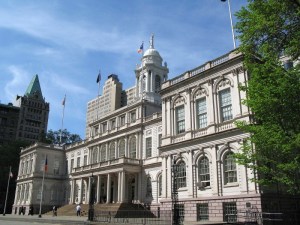Viverito: Don’t Fall for Suburbanite Anti-Pricing “Nonsense”
 We linked to it from Today’s Headlines a few weeks ago, but this Metro op-ed from City Council Member Melissa Mark-Viverito is worth a repeat. Viverito, the first Puerto Rican council member to be elected in Manhattan’s District 8, writes that, contrary to claims from "suburban elected officials from wealthy areas," congestion pricing "could provide immediate and measurable relief of traffic congestion while improving the air that all of my constituents breathe and the buses and subways that they ride daily."
We linked to it from Today’s Headlines a few weeks ago, but this Metro op-ed from City Council Member Melissa Mark-Viverito is worth a repeat. Viverito, the first Puerto Rican council member to be elected in Manhattan’s District 8, writes that, contrary to claims from "suburban elected officials from wealthy areas," congestion pricing "could provide immediate and measurable relief of traffic congestion while improving the air that all of my constituents breathe and the buses and subways that they ride daily."
Note that Viverito’s column, reprinted here in full, was published just before the Traffic Congestion Mitigation Commission released its recommendation.
In the East Harlem and South Bronx communities that I represent, we are automatically skeptical when business interests and politicians from outside our communities claim to be watching out for us – because nine times out of 10, they’re doing just the opposite.
So it is with congestion pricing. For months, some suburban elected officials from wealthy areas, as well as a coalition backed primarily by the American Automobile Association and Manhattan garage owners, have tried their best to cloak themselves as guardians of New York’s poor and middle-class residents.They have cynically insisted, for instance, that congestion pricing – a plan to charge drivers who enter Manhattan’s central business district during working hours – would most affect residents who can least afford it. That is nonsense. The truth is that just 5 percent of commuters in Brooklyn, Queens, Staten Island and the Bronx travel to Manhattan by private car. People who drive their cars to work also earn 30 percent more a year than those of us who use mass transit. It is our poor and middle-class families who would benefit from congestion pricing – as the fees charged to drivers would be used to improve the bus and subway system.
Critics have also tried to whitewash congestion pricing’s health benefits to communities such as Harlem and the Bronx, where kids are hospitalized for asthma attacks far more often than in Westchester, Nassau and Suffolk counties.
Poor communities need creative measures to reduce the vehicle emissions that create the conditions for asthma and other health problems. What we don’t need, want or deserve is to be used as fig leaves for those who represent suburban commuters and parking magnates. I hope the members of the state commission studying traffic congestion have seen through these ploys, and that they listen to the concerns of Bronx residents and other outer-borough New Yorkers. Tomorrow, we will learn for certain if they hear our concerns when they release a report that will determine whether or not the City Council and State Legislature will take up votes on congestion pricing.
Unlike those who falsely claim to speak for the best interests of my constituents, the commission ought to recognize it would be irresponsible not to pursue a policy that could provide immediate and measurable relief of traffic congestion while improving the air that all of my constituents breathe and the buses and subways that they ride daily.
